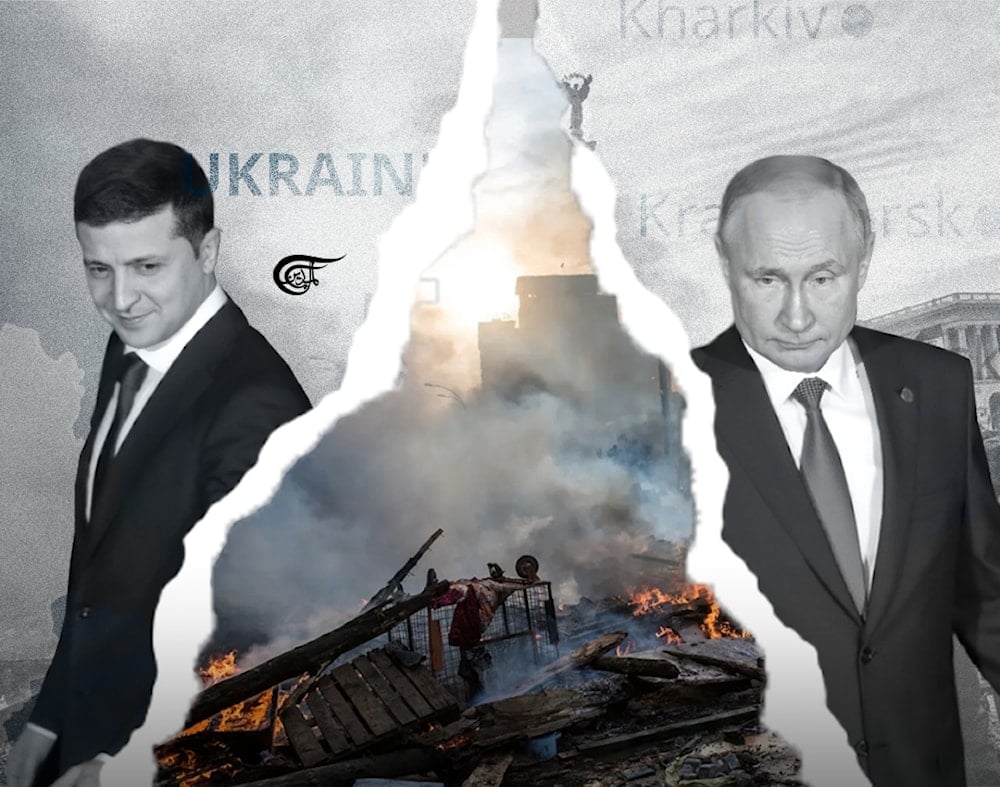Civil War in Donbass 10 years on
At every stage of the Donbass conflict, there were unambiguous indications that the Ukrainian government’s claims of widespread Russian involvement in Donbass were fraudulent.
-

Had Russia accepted the initial agreement, Kiev’s claims that its savage assault on the civilian population of Donbass was in fact a response to invasion by Russia would’ve been legitimised. (Al Mayadeen English; Illustrated by Batoul Chamas)
July 1st marked the 10th anniversary of a brutal resumption of hostilities in the Donbass Civil War. Perhaps unsurprisingly, it passed without comment in the Western media. 10 days before the start of the war, Ukrainian President Petro Poroshenko called for a ceasefire in Kiev’s “anti-terrorist operation”. Launched two months prior following vast protests, and violent clashes between Russian-speaking pro-federal activists and authorities throughout eastern Ukraine, the intended lightning strike routing of internal opposition to the Maidan government quickly became an unwinnable quagmire.
Ukrainian forces were consistently beaten back by surprisingly well-organised and determined rebel forces hailing from the breakaway “People’s Republics” in Donetsk and Luhansk. Resultantly, Poroshenko outlined a peace plan intended to compel the separatists to put down their arms. They refused to do so, prompting the President to order an even more brutal crackdown. This too was a counterproductive failure, with the rebels inflicting a series of embarrassing defeats on the Western-sponsored government. Kiev was ultimately forced to accept the terms of the first Minsk Accords.
This agreement, like its successor, did not provide for secession or independence for the breakaway republics, but their full autonomy within Ukraine. Russia was named as a mediator, not party, in the conflict. Kiev was to resolve its dispute with rebel leaders directly. Successive Ukrainian governments consistently refused to do so, however. Instead, officials endlessly stonewalled, while pressuring Moscow to formally designate itself a party to the civil war.
No wonder - had Russia accepted, Kiev’s claims that its savage assault on the civilian population of Donbass was in fact a response to invasion by its giant neighbour would’ve been legitimised. In turn, an all-out Western proxy war in eastern Ukraine, of the kind that erupted in February 2022, could’ve been precipitated. Which, it is increasingly clear, was the plan all along.
‘Grassroots Movement’
In the days prior to the April 2014 launch of Kiev’s “anti-terrorist operation” in Donbass, notorious war hawk Samantha Power, now USAID chief, openly spoke on ABC of “tell-tale signs of Moscow’s involvement” in the unrest. “It’s professional, coordinated. Nothing grassroots about it,” she alleged. Such framing gave Ukrainian officials, their foreign backers, and the mainstream media, licence to brand the operation a legitimate response to a fully-fledged, if unacknowledged, “invasion” by Russia. It is referred to as such in many quarters today.
Yet, at every stage of the Donbass conflict, there were unambiguous indications that the Ukrainian government’s claims of widespread Russian involvement in Donbass - endorsed by Western governments, militaries, intelligence agencies, pundits, and journalists - were fraudulent. One need look no further than the findings of a 2019 report published by the George Soros-funded International Crisis Group (ICG), Rebels Without A Cause. Completely unremarked upon in the mainstream, its headline conclusions are stark:
“The conflict in eastern Ukraine started as a grassroots movement…Demonstrations were led by local citizens claiming to represent the region’s Russian-speaking majority.”
ICG noted that Russian leaders were from the start publicly and privately sympathetic to Russian-speakers in Donbass. Nonetheless, they issued no “clear guidance” to businessmen, government advisers, or the domestic population on whether - and how - they would be officially supported by Moscow in their dispute with the Maidan government. Hence, many Russian irregulars, encouraged by “what they regarded as the government’s tacit approval, made their way to Ukraine.”
It was only after the conflict started that the Russian government formalised a relationship with the Donbass rebels, although the Kremlin quickly changed tack on what they should do. ICG records how a Ukrainian fighter “began hearing calls for restraint in rebel efforts to take control of eastern Ukrainian towns and cities” in late April 2014. However, “the separatist movement in Donbass was determined to move ahead.”
Due to this lack of control, and repeated calls for direct intervention in the conflict from the rebels, Russia replaced the Donetsk and Lugansk rebel leadership with hand-picked figures, who took an explicitly defensive posture. But the Kremlin was ultimately “beholden” to the breakaway republics, not vice versa. It could not even reliably order the rebels to stop fighting. A Lugansk paramilitary told ICG:
“What do you do with 40,000 people who believe that, once they put down their arms, they will all be shot or arrested? Of course, they are going to fight to the death.”
Elsewhere, the report cited data provided by “Ukrainian nationalist fighters,” which showed fighters killed on the rebel side to date were “overwhelmingly” Ukrainian citizens. This was at odds with the pronouncements of government officials, who almost invariably referred to them as “Russian mercenaries” or “occupiers”. More widely, figures within far-right President Petro Poroshenko’s government had routinely claimed Donbass was wholly populated by Russians and Russia-sympathisers.
One Ukrainian minister was quoted in the report as saying he felt “absolutely no pity” about the extremely harsh conditions suffered by Donbass civilians, due to the “legal, political, economic and ideological barriers isolating Ukrainian citizens in rebel-held territories” constructed by Kiev. This included enforcing a crippling blockade on the region in 2017, which created a “humanitarian crisis”, and left the population unable to claim pensions and welfare payments, among other gruelling hardships.
Several Donbass inhabitants interviewed by ICG expressed nostalgia for the Soviet Union. Others made clear they felt “under attack.” A pensioner in Luhansk, whose “non-combatant son” was killed by a Ukrainian sniper, asked how Poroshenko could claim the territory was “a crucial part” of the country: “then why did they kill so many of us?”
Zelensky chooses war
In conclusion, ICG declared the situation in Donbass “ought not to be narrowly defined as a matter of Russian occupation,” while criticising Kiev’s “tendency to conflate” the Kremlin with the rebels. The organisation expressed optimism newly-elected President Volodymyr Zelensky could “peacefully reunify with the rebel-held territories,” and “[engage] the alienated east.” Given present-day events, its report’s conclusions were eerily prescient:
“For Zelensky, the worst option…would be to try to forcibly retake the territories, as an all-out offensive would likely provoke a military response from Moscow and a bloodbath in Donbass. It could even lead Moscow…to recognise the statelets’ independence. The large-scale military option is mainly advocated by nationalists not members of Ukraine’s political establishment. But some prominent mainstream politicians refuse to rule it out.”
Zelensky did initially try to resolve the Donbass conflict through diplomatic means. In October 2019, he moved to hold a referendum on “special status” for the breakaway republics in a federalized Ukraine, while personally meeting with representatives of the Azov Battalion, begging them to lay down their arms and accept the compromise. Mockingly rebuffed and threatened by the Neo-Nazi group’s leaders, while rocked by nationalist protests against the proposed plebiscite in Kiev, the plans were dropped. So then the President picked the “worst option”.
In March 2021, Zelensky issued a Presidential decree, outlining a “strategy for the de-occupation and reintegration” of “temporarily occupied territory.” Falsely claiming Crimea and the Donbass were “occupied by the armed forces of the aggressor state,” it sketched clear blueprints for a hot war to seize the territories. Immediately, Ukrainian forces began to mass in the south and east of the country in preparation.
This activity inevitably spooked the Kremlin, leading to a huge military buildup on its border with Ukraine, and extensive wargame exercises, plotting scenarios including encirclement of Ukrainian forces in Donbass, and blocking Kiev’s Black Sea access. Suddenly, the Western mainstream became awash with warnings of imminent invasion, and British and US surveillance flights in the region surged. Media reporting either neglected to mention or outright denied this was explicitly triggered by Kiev’s escalation.
Things quietened down thereafter, although the situation on the ground remained tense. In October that year, a Ukrainian drone struck rebel positions in Donbass. Moscow, and German officials, charged that the attack violated Minsk, while Zelensky’s then-right hand man Oleksiy Arestovych denied this was the case. He had by this time openly stated on many occasions conflict with Russia was Kiev’s price for joining the EU and NATO.
Fast forward four months, and at the start of February 2022, French President Emmanuel Macron reaffirmed his commitment to Minsk. He claimed Zelensky provided personal assurances its terms would be fulfilled. Yet, on February 11th, talks between representatives of France, Germany, Russia, and Ukraine collapsed without tangible results after nine hours. Kiev rejected demands for “direct dialogue” with the rebels, insisting Moscow formally designate itself a party to the conflict.
Then, as documented in multiple contemporary eyewitness reports from OSCE observers, mass Ukrainian artillery shelling of Donbass erupted. On February 15th, alarmed representatives of the Duma, led by the Communist Party, formally requested the Kremlin to recognise the Donetsk and Luhansk People’s Republics. Vladimir Putin initially refused, reiterating his commitment to Minsk. The shelling intensified. A February 19th OSCE report recorded 591 ceasefire violations over the past 24 hours, including 553 explosions in rebel-held areas.
Civilians were harmed in these attacks, and civilian structures, including schools, were targeted directly. Meanwhile, that same day, Donetsk rebels claimed to have thwarted two planned sabotage attacks by Polish-speaking operatives on ammonia and oil reservoirs on their territory. Perhaps not coincidentally, in January 2022 it was revealed the CIA had since 2015 been training a secret paramilitary army in Ukraine to carry out such strikes in the event of Russian invasion.
So it was on February 21st, the Kremlin formally accepted the Duma’s request from a week earlier, recognising Donetsk and Luhansk as independent republics. And now here we are.

 Kit Klarenberg
Kit Klarenberg
 9 Min Read
9 Min Read












